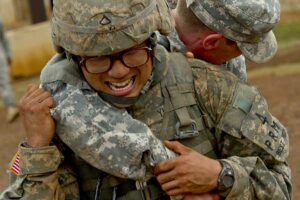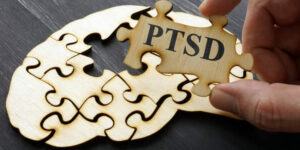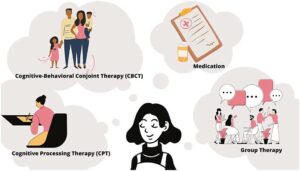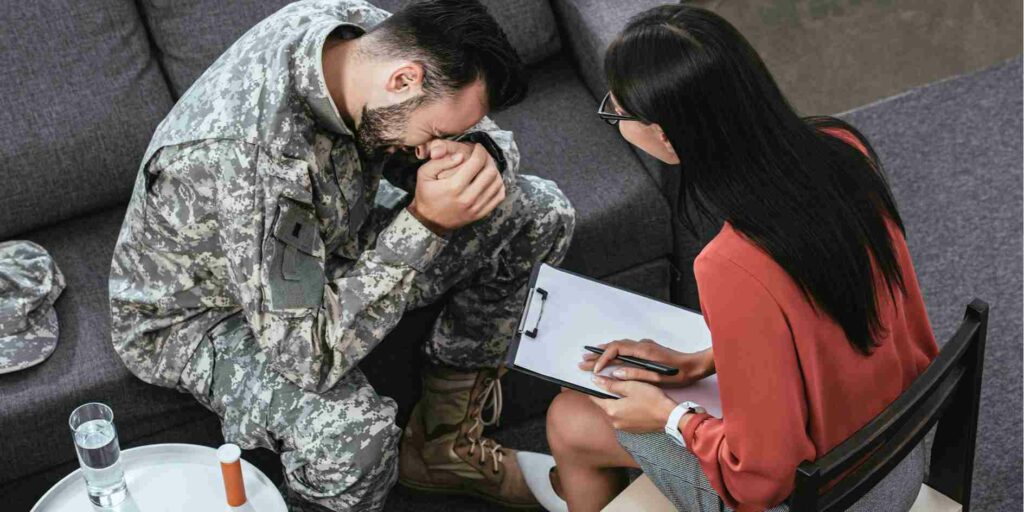If you are a veteran who is struggling with post-traumatic stress disorder, you are not alone. PTSD is a common problem that many veterans face after returning from combat. Fortunately, there are treatments available that can help you manage your symptoms and live a normal life. In this blog post, we will discuss the causes of veteran PTSD, the symptoms of PTSD, and the treatment options available for veterans with PTSD. We will also provide information on how to get help for PTSD.
Contents
What Is Veteran PTSD?
 Veteran PTSD is described as a condition that can develop after a person has experienced or witnessed a traumatic event. For veterans, this can include things like combat, sexual assault, and natural disasters.
Veteran PTSD is described as a condition that can develop after a person has experienced or witnessed a traumatic event. For veterans, this can include things like combat, sexual assault, and natural disasters.
Many people who go through these events don’t develop PTSD, but for some, the experience can be so overwhelming that it changes their life.
If you’re a veteran struggling with PTSD, know that you’re not alone. It’s a very common condition, affecting an estimated 11-20% of veterans who have served around the globe.
PTSD can present itself in many different ways. Some people have trouble sleeping, others may avoid places or activities that remind them of the trauma. Many people with PTSD feel depressed, anxious, or angry. You may find yourself drinking or using drugs to cope with your symptoms.
5 Symptoms Of PTSD
There are various symptoms of PTSD, and they can differ from person to person. Here are five of the most common symptoms:
- Flashbacks: One symptom of PTSD is feeling like you’re relieving the traumatic event over and over again. You may have flashbacks in which you see, hear, or smell things that remind you of the trauma.
- Avoidance: You may try to avoid anything that reminds you of the trauma. You may even go out of your way to avoid people, places, and things that remind you of what happened. It’s common for people with PTSD to have negative thoughts about themselves or the world around them. They may feel hopeless.
- A worsening of cognitive function and mood: People with PTSD may have trouble remembering things or they may believe things that aren’t true. They may also feel detached from other people and have decreased effect on activities. Sometimes, they always feel isolated and feel guilty for themselves or others for the trauma.
- Changes in Emotional Reactions: People with PTSD may have intense emotions, such as anger, sadness, or fear. These emotions can be out of proportion to the current situation. They may also have trouble controlling their emotions.
- Arousal and Reactivity in Trauma: You may feel on edge all the time. You may be easily startled or always on the lookout for danger. This is called hyperarousal. It can make it hard to concentrate or sleep.
If you have any of these symptoms, it’s important to get help from a mental health professional who specializes in PTSD. Treatment can help you manage your symptoms and get your life back on track. So, these are some of the symptoms that are generally seen in a person suffering from PTSD. It is important to note that not everyone experiences all of these symptoms and that the severity of symptoms.
What Are The Most Frequent Causes Of PTSD?
 There are various causes of PTSD. Some of the most frequent include:
There are various causes of PTSD. Some of the most frequent include:
- experiencing a life-threatening event
- witnessing a traumatic event
- serious or fatal accidents
- physical or sexual assault
- seriously health-threatening problems such as being admitted to a healthcare facility.
- abuse including childhood or domestic abuse.
- losing a baby during childbirth or any sudden death is an unimaginably difficult experience.
- battle and conflict
- work-related trauma, such as being exposed to death or disaster at a distance.
- torture
PTSD can develop after a one-time event or it can be the result of exposure to multiple traumas. You may not have any symptoms for weeks, months, or even years after the event. PTSD can occur at any age, including in children. PTSD is not a sign of weakness. It is a sign that you have been through a lot and need some extra support to heal.
How Does PTSD Affect Veterans?
There could be numerous impacts on a veteran’s life when they come back from combat. Let’s discuss some common consequences in detail:
Social Life
It is one of the common symptoms for veterans to lose interest in socializing and feel isolated from family and friends. This is because they might not be able to relate to people who have not gone through the same experiences.
Intimate Relationships
Many veterans find it hard to be intimate with their partners. They may have problems with trust, closeness, communication, and sexual activity. These problems can lead to the end of a relationship.
Employment
Veterans may have a hard time keeping a job or finding employment after they leave the military. This is because PTSD can cause symptoms that make it hard to work, such as anxiety, depression, irritability, and insomnia. For example, a veteran may have flashbacks of combat that make it hard to concentrate on work.
Substance Abuse
Many veterans turn to drugs or alcohol to cope with PTSD. This can lead to problems with addiction and mental health. For instance, people with PTSD are more likely to develop a problem with alcohol. Because of this, veterans need to get help for PTSD before it leads to substance abuse.
Physical Health
Physical health can also be affected by veteran PTSD. Many veterans with PTSD experience chronic pain, headaches, and gastrointestinal problems. They may also have a higher risk for heart disease and other health problems.
If you or someone you know is experiencing any of these symptoms, it is important to get help. There are many resources available to veterans with PTSD. Also, you should understand that you are not alone. Many veterans experience similar consequences and there is help available.
How Can You Manage It?
It’s possible to cope with post-traumatic stress disorder by doing daily self-care.
- Stay in Touch with Nature: spending time in nature is a great way to reconnect with the world around you. Whether you’re hiking, camping, or just spending time in your backyard, getting away from technology and back to nature can do wonders for your mental health.
- Connect with positive people: spend time with positive, upbeat people to stay calm and stress-free.
- Alcohol and drugs: it is important to avoid using alcohol and drugs.
- Mental Health: practice meditation and breathing techniques daily.
- Maintain Physical Health: exercises will improve your overall health and the quality of your life.
- Join Support Group : veteran PTSD support groups are available to help you. Talking to a therapist can be very helpful
These are some pointers for effectively dealing with post-traumatic stress disorder.
What Are The Treatment Options?
 There are several treatment options available for veterans with PTSD. The most common are as follows:
There are several treatment options available for veterans with PTSD. The most common are as follows:
- Cognitive Behavioral Therapy (CBT): CBT is a type of therapy that helps veterans identify and change negatively. thoughts and behaviors.
- Exposure Therapy: Exposure therapy helps veterans face their fears and memories of the trauma in a safe environment.
- Medication: Several types of medication can help veterans with PTSD, such as antidepressants and anti-anxiety medication.
- Group Therapy: Group therapy helps veterans connect with other veterans who have been through similar experiences.
- Family Therapy: Family therapy can help veteran PTSD sufferers and their loved ones understand and support each other.
Depending on what works better for you, group or family therapy sessions might be a good option instead of individual ones.
Conclusion
In conclusion, veteran PTSD is a real thing. And it is something that can be effectively managed with the right tools and treatment options. If you or someone you know is suffering from veteran PTSD, don’t hesitate to reach out for help. There are many resources available to help veterans cope with their PTSD and live happy healthy lives.
PTSD is a serious condition that can have a profound effect on veterans and their families. If you or someone you know is struggling you can reach out to us at Therapy Mantra. You may also schedule an online therapy session or download our free Android or iOS app.


